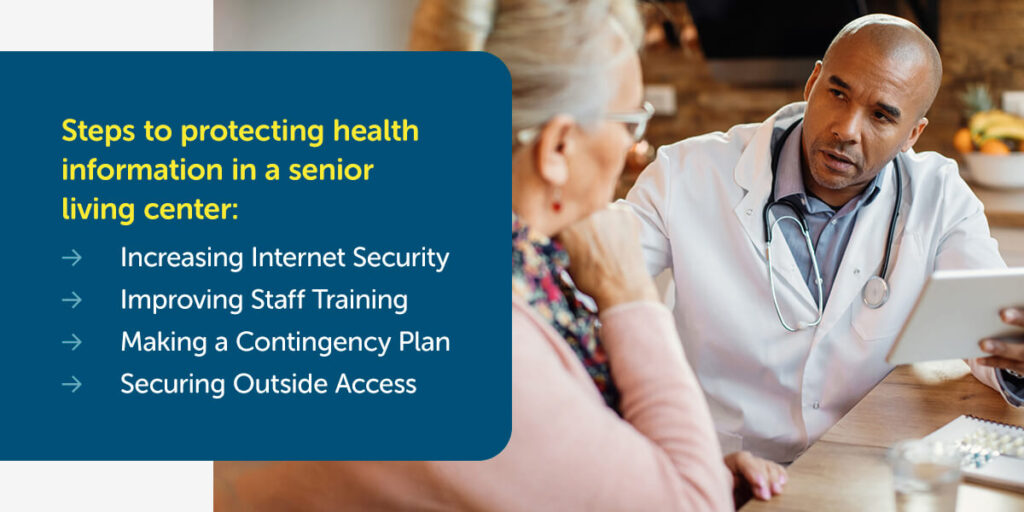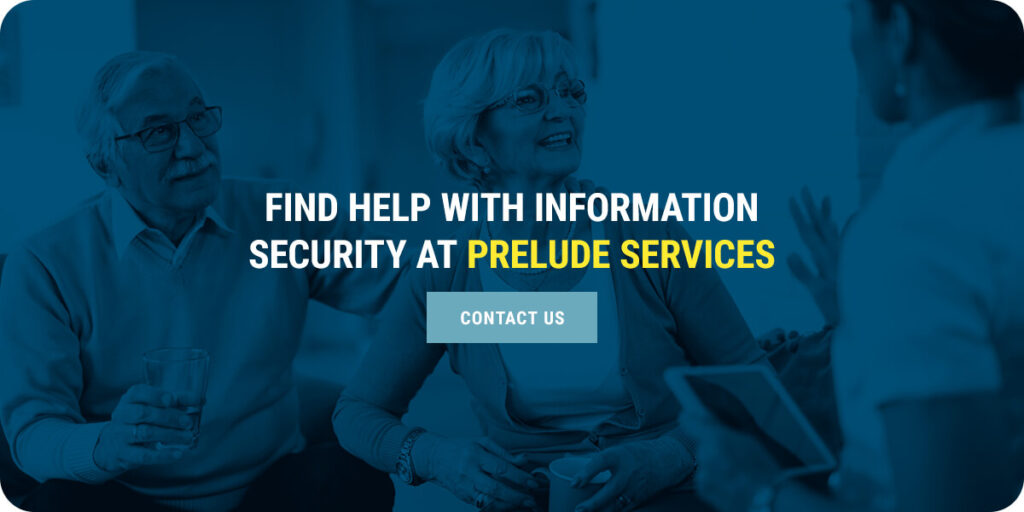
How to Protect Health Information in a Senior Living Center
Senior living centers must protect information regarding patients’ medical records, prescriptions, diagnoses and medical history. Most of this information is private and sensitive, making it essential to protect it from potential hackers or cyberattacks.
Learning about the Health Insurance Portability and Accountability Act (HIPAA), its importance and who needs to comply with HIPAA can help your facility protect information at every step. Senior living centers can take critical steps for protection, including staff training and internet security.
What Is HIPAA?
HIPAA is a United States law that protects patients’ medical records from being shared with other parties without the patient’s consent. HIPAA sets a standard for privacy that healthcare providers, plans, clearinghouses, and business associates related to healthcare must follow at every step.
The U.S. Department of Health and Human Services (HHS) implemented both the HIPAA Security Rule and the HIPAA Privacy Rule. The Privacy Rule ensures that healthcare-related industries and companies comply with HIPAA regulations, while the Security Rule protects additional health information outlined in the Privacy Rule.
Why Is HIPAA Important?
HIPAA is important in the healthcare industry because it protects sensitive patient information. Many residents cared for in a senior living center have various health issues, whether due to aging or preexisting conditions. Senior living center patients often require various medical provisions or prescription drugs, making it integral to protect sensitive information related to resident records.
Any nurse, employee or staff member who works with seniors at nursing homes or living centers must have easy access to residents’ information to ensure each patient receives appropriate care and medications related to their condition. Should something happen, it is essential to have medical records on hand with information about allergies, prior illnesses and health problems or other relevant information.
At the same time, easy access to patient information requires extra protection to prevent leaks or violations of patient rights. This is why HIPAA was created. Many of the benefits of the Act include the following:
- Patient control: All patients have complete control over their medical information, including who can see it or when it can be shared.
- Boundaries: HIPAA ensures safe limits for sharing and distributing patient health information.
- Safeguards: All providers and medical professionals related to the patient must protect residents’ health information privacy.
- Accountability: Anyone who violates the rules and regulations of HIPAA will be held accountable.
All patients deserve to know how their private health information will be used. Even older adults in nursing homes require boundaries and limits on information release and have the right to receive copies of records whenever asked.
Who Must Comply With HIPAA Guidelines?
All companies, organizations, businesses and operations that handle protected health information must comply with HIPAA guidelines. For example, the following organizations must remain compliant with HIPAA rules and regulations:
- Health plans: Plans might include Medicaid, Medicare or other specific health programs.
- Healthcare clearinghouses: Clearinghouses include any billing services and companies that collect sensitive health information and process private data.
- Healthcare providers: Providers may include a dentist, surgeon, physician, pharmacy, hospital, clinic or nursing home.
- Business associates: Businesses that handle health information include document shredding, medical equipment, data processing and data storage companies.
While HIPAA specifically requires nursing homes to follow their guidelines, other senior living centers and care facilities may not be held to the same laws if they don’t specifically handle health information. Many communities with different models have their own regulations, as HIPAA may not apply to every organization.
However, if your senior living facility handles any form or amount of healthcare information, it must comply with HIPAA guidelines. It is best practice to follow HIPAA regulations at every step in the process, no matter how much health information you contain.
In many cases, some organizations may be confused when specific departments or sections of the company work alongside hospitals and healthcare workers who must comply with HIPAA. Following HIPAA regulations ensures patient privacy, and while HIPAA may not specifically name some senior living facilities, it is best practice to follow their guidelines regardless.
All residents, staff members and healthcare workers at the senior living facility must comply with HIPAA regulations, including refraining from discussing patient information outside the workplace. Keep medical history and patient information private to prevent accidental leaks.
How To Protect Senior Health Information

Protecting sensitive patient information requires adherence to rules and regulations from every nurse, employee and healthcare provider. Here are four steps to protecting health information in a senior living center.
1. Increasing Internet Security
Increasing your facility’s internet security is a great way to protect senior health information. Many facilities have done away with traditional paperwork filing, mailing or data entry, meaning technology has helped reduce the need for manual labor. However, the possibility of hackers and cyberattacks comes with the increased usage of computer systems and the quick transference of confidential information.
To comply with HIPAA, your facility needs secure software for sensitive information. Ensure you have the firewall applications to block ransomware, malware and phishing attempts. Many IT security companies and outside sources offer the protection assistance you need to fend off possible leaks and attacks.
2. Improving Staff Training
Training staff members, nurses, and all employees in your facility on HIPAA guidelines ensures you maintain compliance at every point. Proper training in HIPAA regulations, data protection and rules allows employees to refer to privacy guidelines when unsure of the next step. You can even have staff members take courses on protecting patient and resident privacy.
3. Making a Contingency Plan
Make a plan of action should your facility accidentally leak sensitive information or experience a breach in security. Adding security and training measures can only go so far. Data breaches and privacy violations may be possible, but an action plan ensures your company knows what to do in the case of a leak.
Make sure you track every investigation of a data breach to completion. It should also be possible for staff members to report incidents anonymously when needed.
4. Securing Outside Access
Due to the nature of your senior care facility, you may have to work with various businesses, care workers, nurses, facilities and individual family members. Third parties often have short-term access to your documents, patient information and sensitive data. The more outside sources gain access to your facility’s private information, the more you must take care to protect that data.
To secure outside access, be sure all partners sign an agreement with your facility. Do so for any third-party vendors, including but not limited to” attorneys
- Consultants
- Accountants
- Software companies and technicians
- Document destruction services
- Malpractice carriers
- Telephone providers
All third parties are prohibited from selling or sharing patient information, according to patient rights outlined by HIPAA.
Find Help With Information Security At Prelude Services

Our IT management, security and strategic planning services at Prelude Services protect sensitive patient information. Our services are meant for healthcare providers, whether you work in senior living centers, long-term care, community service or affordable housing. Our secure IT software lets you protect patient information at every step of your facility processes.
Data security and reliable technology are essential to us. Consider partnering with Prelude Service for all your information technology needs. Contact us today to speak to a representative.
CONTACT PRELUDE SERVICES FOR 24/7 IT SUPPORT
Technology has become a crucial part of the modern business experience. Without functional computers and mobile phones, many business practices would grind to a halt. Unfortunately, breakdowns and malfunctions are an inevitable part of any machine, meaning businesses do grind to a halt until the issues are fixed. In order to keep your business running, it's crucial to have access to IT support when you experience technical difficulties.
If you're a healthcare company, long-term care provider, or small business in need of IT support at all hours, consider Prelude Services. We're a SSAE SOC
Compliant business dedicated to improving your security and functionality. We offer specific IT services for senior living care, nursing homes, retirement home services and assisted living, including 24/7 IT support. If you want to know how Prelude can help you, contact us today!
